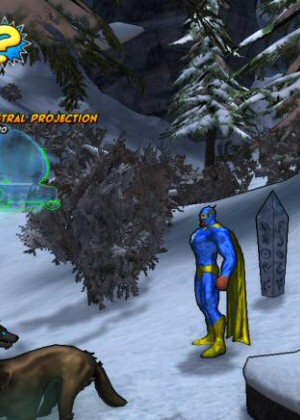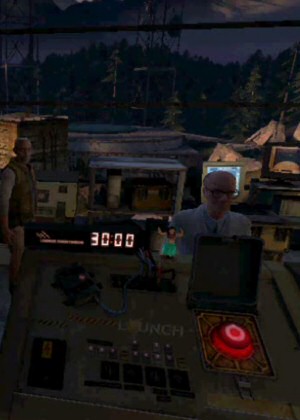
Shamus Says:
Note that I left the character designs to Shawn. My only directive for Jade was “looks a bit like Marcus” and “inappropriately dressed”. Although, she’s certainly more appropriate than Sapphire was.
Shawn Says:
I don’t know, I think the corset, the Shelf O Boobs, and the thigh high boots might be less appropriate than the original chainmail bikini.
Also, the background on panel 1 was an experiment, and still bugs me to this day. I do love the pig toss though.
A Star is Born

Remember the superhero MMO from 2009? Neither does anyone else. It was dumb. So dumb I was compelled to write this.
The Loot Lottery

What makes the gameplay of Borderlands so addictive for some, and what does that have to do with slot machines?
Silent Hill Origins

Here is a long look at a game that tries to live up to a big legacy and fails hilariously.
Push the Button!

Scenes from Half-Life 2:Episode 2, showing Gordon Freeman being a jerk.
Bowlercoaster

Two minutes of fun at the expense of a badly-run theme park.
 T w e n t y S i d e d
T w e n t y S i d e d

WHAT?!!! That bard is Hot. How come there no lesbian sex?!!
LFGS :P
Eeesh. That corset. A perfect fit for those without ribs or lungs.
Though I bet Marcus would try to pass that get-up as master-crafted leather armor…
It’s a racial benefit of elves maybe.
But wait. What party doesn’t have a healer? This seems like an important oversight.
They don’t seem to need a healer, considering one of them died and came back immediately. Sure, he changed his class, but he’s still back.
Bards have been pretty good at healing in most D&D editions that they’ve appeared in, although never as good as clerics and often at the cost of their better abilities.
It’s funny you mention parties without healers, because I do mostly organized play, and in our campaign, the most common party healer is a wand of cure light wounds (or six).
It doesn’t help that combat healing is REALLY bad in D&D. “Use a spell slot and your action to recover half the damage a single person took in one round”
One of those things that 4th edition actually fixed that was walked back by 5e.
A battle that goes on and on while all incoming damage is healed is pretty boring…
I guess if you have limited-use healing surges it allows for greater healing without being able to keep it up all day.
That’s exactly how and why it worked. The healing spell(s) were powerful enough to be worth casting, but were limited by a character’s total number of Healing Surges.
Meanwhile 5e healing spells are scarcely worth the time (except the Bonus-Action ones, and those are just to pop someone back onto their feet most of the time).
In my experience, in-combat healing is usually more about condition removal and prevention, but channeling positive energy is a reasonable way to spread healing around the table within your action economy.
A player character should not be able in one round to undo the effects of a threatening opponent, even with the expenditure of daily-renewable resources.
Because that kind of ability leads to the situation where fights drag out. High-level 4e combat would drag on and on largely because almost all healing scaled with level.
At what level are we talking? The heal spell can do just that, and it’s available by level eleven.
Healers in DD&D? No need.
The lute looks like a giant ball-sack. I can’t stop seeing it, so please suffer along with me.
And that’s when the party found out there was an aroused giant lying behind Jade Moonsong…
I really wish you hadn’t posted that … pass the brain-bleach please
Will twenty bottles of vodka suffice?
Right, I’m not the only one seeing this?
Olde fashioned stringed instruments were covered in animal hide back in the day. Jade’s lute isn’t cat-gut… turns out giant ball sacks are the best leather for bardic lutes…
I thought Jade was suspended by the waist with a giant rope at first.
Not an inaccurate picture of how new PCs enter the game.
As is the pig-throw in the second panel.
I thought maybe it was an oboe or something. Reminds me of the time I made a bard with an alp-horn, which has a 1-3 mile effective radius. So of course we were crawling around in dungeons and caves the whole time.
I dunno – crawling through a dark, cramped cave sounds like the perfect time and place to practice your yodeling.
Proficiency in yodeling has the benefit of doubling as a language proficiency for most of the Far Realm.
I sometimes wonder if the explanation of “Bards suck” that permeated 3.X (rightfully or wrongfully in 3.X and Pathfinder) and led to this kind of joke in other media like this and The Gamers came about because they sucked in 2nd Edition and thus there was an inherent expectation of “that’s how things are”. I’m surprised there wasn’t more noticeable pushback when they made Bards better in 4th and 5th Edition (especially the latter when they gave them a full spell tree up to 9th) from people saying “You can’t make them this powerful, they’re *supposed* to suck compared to a Cleric”.
I only started with D&D in the 3.5 era, so I can’t speak to earlier periods. I think at least part of the perception of bards, in that regard, was their general lack of offensive spells, rendering them almost entirely a support class. Plus, they had to use their music for a lot of their class features; since you can’t swing a sword and play a lute, you were often stuck in certain roles.
I don’t remember reading any complaints about bards being too good in 5th edition; the pushback on bards in 4th edition was a much different thing, more related to system complaints than anything else.
I don’t know 3.5 bards all that well, but in Pathfinder, half the Perform skills work with your hands free. Even if you want to go with an instrument, there’s a feat (Catch Off-Guard) for going the El Kabong route.
I can see the issues with the second-edition bard projecting forward, combined with the lack of damage-dealing magic — although bards can do a pretty good job of battlefield control.
Pathfinder bards are (potentially) a great class, but they require a fair amount of system expertise to do well. Usually you have to either focus on being a rapier guy, or a mind-affecting magic user. If you try to be a jack-of-all-trades, you end up being mediocre at everything (but still capable of providing useful buffs). So depending on personal experience, a Pathfinder player might also believe that bards are weak.
While not untrue, just about everything in Pathfinder requires system expertise. Also, it may be the folks with whom I play, but very few characters don’t laser-focus on a combat role.
It’s a conscious act of willpower on my part not to go off on a tirade about the ubiquity of the rapier.
But the bard’s combat role is in increasing all other combatant’s damage.
Everyone that makes an attack roll benefits from Inspire courage, and everyone that misses on a 2 and hits on a 19 gets at least a 5.5% boost in damage output from +1 to hit; a typical combatant sees about a 10% increase in expected damage from a +1, up to a 100% increase for a +10. Since Inspire courage also does a damage buff, the bard can easily be responsible for the majority of damage: All of the morale bonus from the song, plus the entirety of every attack that would not have hit without the bard (or possibly all of the power attack damage done, if the PA would not have been chosen without the offsetting to-hit).
Oh, and the bard can also attack and cast on their own.
That’s certainly their classical role, and it’s how I play my bard. However, Pathfinder bards can do other stuff instead, because Shelyn forbid a character option not be available somehow. Archetypes exist that focus their buffs on themselves alone (the Dawnflower dervish) or convert performance into a debuff for opponents (the court bard).
I thought jokes about bards were either jokes about the concept rather than the mechanics or, about a hundred times more commonly, jokes about players who play bards and the torture of putting up with them.
Yeah, this is probably true. I’m amazed Marcus’ first character wasn’t a bard, given his proclivity for monologuing…
There’s also the fact that by FAR the majority of groups that I’ve ever heard about or talked with or whatever, have a very strong combat-focus. Talking and plot and all that are nice, but in the end people want to roll dice and kill orcs (or dragons, or ents, or whatever). Bards have a lot of benefits, but in combat ,they’re mostly “second best” at…everything. The fighter and paladin tank better, the wizard and sorceress magic better, the cleric will support better, the rogue is a much better DPS… A rogue or paladin are also useful in out-of-combat situations (a fighter usually not so much), but still have strong combat skills. A Bard, certainly in 3.0 and still in 3.5, is barely useful if you consider the dice the most important bit of the playing.
And the bard’s two greatest strengths–knowing lore and social interactions–are also the least interesting to resolve mechanically, especially in D&D. Making a lore check means listening to the DM for a few minutes (“The bard tells you the legend of the Black Temple…”). And D&D has little interest in making social interactions even 1/10th as mechanically interesting as physical combat. It’s generally either pass/fail, in which case your smooth-talking bard PC might as well be making climbing or blacksmithing checks, or ignored in favour of “real role-playing”, in which case why even have social interaction mechanics.
Funny story, my first tabletop group was playing Earthdawn, I joined around the time the GM decided he’d rather reset the party and start afresh so my second character was a bard (troubadour). Now admittedly Earthdawn is a somewhat different beast but the prescribed system of social interactions, as usual, sucked (don’t ask me which edition it was, it’s been something like 20 years) and the GM favoured “actual roleplay” in conversations and did not usually bother with doing things like “your argument is sound but roll for how well you present it”. That said, the party quite literally never had a social interaction character before and me being the type to read the rulebook suddenly started popping up with all sorts of “I have a skill for that!” situations. The GM also had a run with my character doing all sorts of fancy stuff being this over the top gay elf bard (I came out to that gaming group), much mirth and much groaning was had even if I did not excelt at combat to put it lightly… and then we reached a point where we encountered Horrors and the rest of the party discovered a… peculiarity in Earthdawn’s mechanics.
You see Earthdawn had, IIRC, three passive “defenses”, essentialy target numbers, derived from your base attributes in case of player characters: physical, magical and social. Hostile interaction needs to break defense to affect a character and assigning ability to a defense is pretty self expalantory? So generally because charisma is a dump stat for near everyone social defense is non-existent in the party, which doesn’t matter all that much because we don’t bother with the mechanics of stuff like the NPC lying to us and instead just decide if we believe them. Except enter the Horrors. In case you haven’t figured it out Horrors are the big bads of the setting, creatures from the astral plane that literally feast on destruction, suffering and pain, sometimes directly, sometimes by slowly driving people to madness and despair. For some (personally I suspect balancing) reasons the vast majority of Horrors’ unique abilities target social defense, which makes, sense in case of something like them whispering “maybe you should slit your companion’s throat and dine on their flesh” into your mind but perhaps slightly less when they just make your skin pick up and leave in stripes. So suddenly as soon as a Horror starts stalking us everyone is like “OMG please let it target the bard he’s the only one who can actually survive this”.
“ignored in favour of “real role-playing”, in which case why even have social interaction mechanics.”
This is an interesting side issue. Taking 20 made a video on this where he argued that most people resolve social rolls in D&D backwards from the rest of the game.
The short version in that every other aspect of D&D, you roll first and then describe afterwards what happens based upon the rolls. Player attempts to jumps across a chasm, with a DC of 10. Player ends up rolling exactly a 10. DM (or player) then describes how the character made a flying leap and landed on the edge of the chasm, with their heels hanging just off, struggling for balance, before finally stepping off the brink.
Contrast this to social rolls, where a player can make the most cogent, eloquent argument and end up rolling so poorly they fail in their attempts to persuade, intimidate, or whatever. My wife had the opposite of this, where her Half-Orc Druid cussed out two groups of NPCs for being absolutely idiots, etc., etc., and then rolled a Nat 20 for her Diplomacy.
Taking 20’s argument is that we should resolve social interaction the same way that we do any other check: have the player roll, and then decide what they say based upon that roll. An awesome example of this is from DM of the Rings, where Gimli makes his “Horse-Fucker” comment and explains that it was due to him rolling a 1 on Diplomacy.
I think with this latter approach, you’re still getting plenty of role-playing, but it’s more organically flowing from the game as opposed to being in opposition to it.
There’s also a problem where many characters are better at diplomacy than their players are. It’s easy to describe how a character jumps 20 feet from a standing start; it’s harder to describe a result of 40 on a diplomacy check.
I can’t say I like that idea. The players have to think of several things to say, but then rolls to see what actually comes out?
Much better (to me at least) would be factoring in the player’s roleplay to the attempt, most simply as a modifier. A Player puts forth a well-reasoned argument to a scientist? +5 to the individual roll.
A Player puts intellectual argument to a mob of angry farmers with pitchforks? -3, they don’t understand the long words and that makes them dislike him even more.
A Player just declares a persuasion attempt? +0, or -1 Lazy Roleplayer penalty.
Etc.
“The players have to think of several things to say, but then rolls to see what actually comes out?”
I’m not following you here. This is how many groups are currently doing things. Player says X, but then rolls Y to see result, which can be completely at odds with each other (good argument/abysmal roll, vice versa). Your example is doing the same thing, but giving bonuses/penalties based upon what they are saying. It’s also not really having them be lazy if you encourage them to act out the results of a roll. You attempt to Persuade them, you need a DC 16, so what do you roll? “I have a +5, so (*rolls, and then pauses for a second*)…that’s a total of a 6.” DM: “You utterly failed to persuade them. Would you like to role-play out what happened and describe what your character said to get such a poor reaction ?”.
And then you have many other groups which start the same way with players role-playing out what they say every time, but then leave rolling out altogether. It sounds great in theory, but then you have the same players always acting as the party’s Face regardless of character, Charisma can truly be a dump-stat for anyone not in the proper Class, and the DM is forced to always make custom arbitrations on every interaction between PCs and NPCs. Some may like this, for others it can get old.
Yeah, I didn’t put it that clearly. What you were describing is more ‘roll the dice, then decide what’s said based on that’. Which is sort of against the spirit of a ‘role-play’ game, at least to me…
To simulate combat, I need dice/stats as I’m not really fighting a goblin/climibg a wall or whatever else is happening. But I CAN make a speech, or prepare an argument, or talk to someone, so in a sense the dice are unnecessary.
Of course, completely ignoring character stats/dice rolls has its flaws – as you said – so factoring in what the player says to the roll’s difficulty is just my way of trying to merge the player’s actions and the stats/dice.
Several Pathfinder Society scenarios have mechanical systems for building up influence with important NPC’s, and less talky characters can study the target to look for better ‘approach vectors’ for conversation, or even other skills to use instead of Diplomacy. It’s not perfect, but I vastly prefer it to a one-off skill check.
There’s also a ‘knowledge combat’ system that’s been used for beefy research tasks.
Yes, I do favor out-of-combat utility in my role-playing characters. Why do you ask?